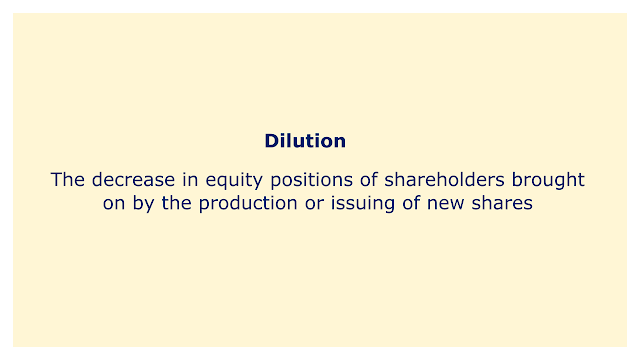 |
| Image: Moneybestpal.com |
In the world of finance, dilution refers to the decrease in equity positions of shareholders brought on by the production or issuing of new shares. Moreover, dilution lowers a company's profits per share (EPS), which could be detrimental to share prices.
When a company raises new equity capital, dilution might happen, although current shareholders typically suffer.
The causes and effects of dilution might vary depending on the circumstance. Some possible causes are:
For shareholders, dilution is not always a bad thing because it could also mean that the company is expanding and gaining more market value. To prevent upsetting investors and hurting shareholder value, dilution should, however, be carefully managed and reported.
The causes and effects of dilution might vary depending on the circumstance. Some possible causes are:
- Initial public offering (IPO): the process through which a business sells shares to the public for the first time.
- Secondary offering: the issuance of additional shares by a corporation to raise additional funds following its initial public offering (IPO).
- Stock options: When a corporation gives its employees or other parties the right to purchase shares at a fixed price within a specific time frame.
- Convertible securities: When a business issues bonds or preferred shares that can be converted into common shares under specific circumstances.
- Stock splits: when a firm divides one share into numerous shares to increase the number of shares outstanding.
Some possible effects are:
- Lower ownership %: Dilution lowers the % of shares owned by existing shareholders in comparison to new shareholders.
- Decline in EPS: By increasing the number of shares used to calculate it, dilution results in a decline in EPS.
- Drop in share price: By diminishing the demand for existing shares and increasing the supply of new shares, dilution may result in a decline in share price.
- Capital increase: Dilution could result in more funds being available for the business to invest in expansion possibilities or pay off debt.
For shareholders, dilution is not always a bad thing because it could also mean that the company is expanding and gaining more market value. To prevent upsetting investors and hurting shareholder value, dilution should, however, be carefully managed and reported.
